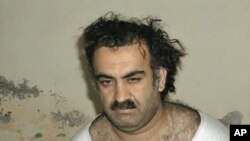The cases of the five suspected al-Qaida militants believed to have planned the September 11, 2001, terror attacks on the United States have been formally referred to a military tribunal.
The self-proclaimed mastermind of the 9/11 attacks, Khalid Sheikh Mohammed, and his four alleged co-conspirators, could face the death penalty if a U.S. military commission finds them guilty for the attacks that killed nearly 3,000 people.
In a statement Wednesday, the Defense Department said the defendants are due to appear in court for arraignment proceedings within 30 days. The trial will be held at the U.S. naval base in Guantanamo Bay, Cuba, where the United States has special military commissions set up to try terror suspects.
The five face a litany of charges, including terrorism, hijacking aircraft, conspiracy, attacking civilians, murder and destruction of property in violation of the law of war.
Pentagon officials say they have provided the defendants, Khalid Sheikh Mohammed, Walid Muhammad Salih Mubarak Bin Attash, Ramzi Binalshibh, Ali Abdul Aziz Ali and Mustafa Ahmed Adam al Hawsawi, each, in addition to their detailed defense council, attorneys with specialized knowledge and experience in death penalty cases in order to assist in their defense.
Despite these considerations, human rights groups again criticized the use of military tribunals as opposed to civilian courts. Laura Pitter is a lawyer and counterterrorism adviser for Human Rights Watch.
"Coerced evidence is still allowed in certain circumstances," said Pitter. "Torture can seep in to some of the evidence that will be admissible. [The system in] Guantanamo is not in line with any fair trial justice standards, so it will taint any verdict that's arrived there."
Pitter says she believes this is unfortunate, considering there is a viable option in the U.S. federal court system.
"Part of what Americans really believe in is that even the worst of the worst are to be tried in a fair system," she said. "They need to be tried in a system that's recognized as fair by international standards and U.S. domestic standards. So to do so in a different system really does not make any sense."
U.S. President Barack Obama initially had pledged to try the accused in a civilian court, but he reversed course a year ago after U.S. lawmakers passed restrictions prohibiting the transfer of terror detainees to the United States.




